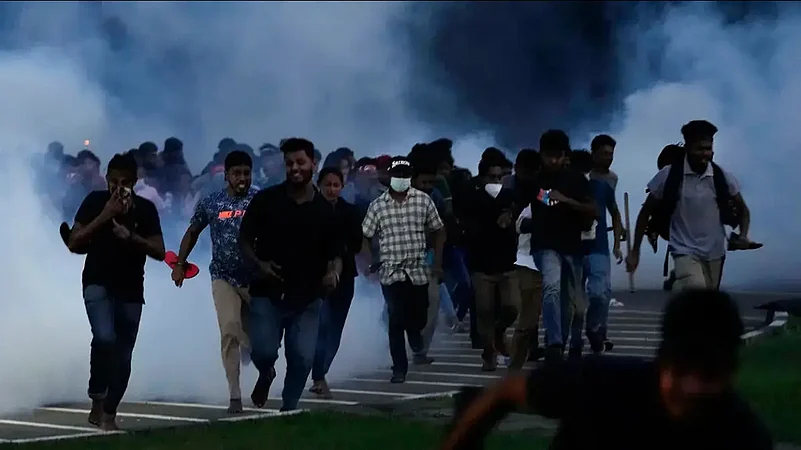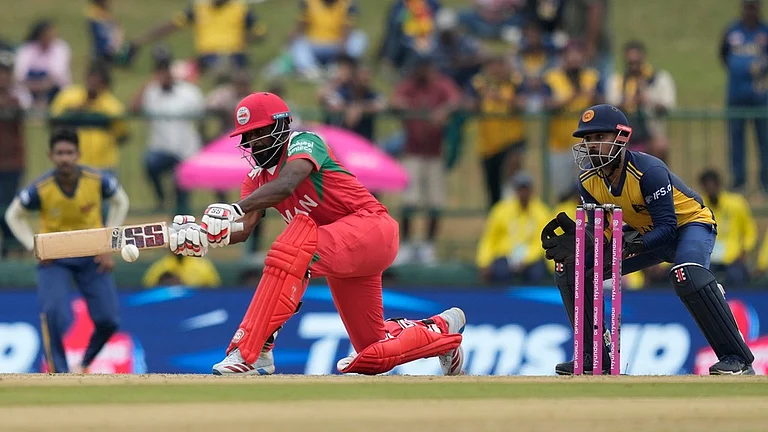The spiraling crisis in Sri Lanka is not all about gloom and doom. Yes, the economy has collapsed, the political system is unable to deliver, and social unrest is at a peak. But the dire situation has led to a mass awakening of people demanding a complete overhaul of the island’s political system and governance model.
People want accountability from the ruling class and are no longer willing to trust political leadership. It is too early to predict if street power can be sustained or an easing of the economic condition will change the mood of the country, but the conversations at protestor sites are about democracy, accountability, and transparency.
Future governments can ignore these at their own peril. Ironically it is these very same masses that voted the Rajapaksa brothers to power in the presidential and parliamentary elections.
The power of a people’s movement has forced one of Sri Lanka’s most powerful political leader, Mahinda Rajapaksa, not just out of office but to also flee for protection from angry mobs and take shelter in the Trincomalee naval base. These are the same people that once worshipped him and compared him to the ancient Sinhala warrior king Dutugamunu.
The protesters will not leave till Mahinda’s younger brother Gotabaya steps down. The president’s time is up and the sooner he sees the writing on the wall the better for the island nation.
The Rajapaksas are the main target at the moment, but the streets are not welcoming traditional politicians either. The economic tribulations have led to a rethink and questioning of all aspects of government by not the elite but by ordinary folks – young people, students, lawyers, professors, economists, farmers, and small business owners.
It’s a groundswell of anger at the corrupt system and what Radhika Coomaraswamy calls “active citizenry” people as watchdogs of the government. It is now a movement for not just political and economic reform but social change to rebuild Sri Lanka. It is a kind of awakening for the country with ordinary people becoming aware of their rights and where the government is leading them.
Whether it is the interim government with Ranil Wickremasinghe as prime minister or any government sworn in after fresh elections perhaps six months to a year from now, an alert public will hold them accountable. It is unlikely that ruling parties can do as they please in the future.
Radhika Coomaraswamy, a lawyer and a former UN diplomat, says, “I would say that the situation is tense and volatile. The economic hardships are unbearable but the protest movement has given birth to an active citizenry interested in good governance and it is unlikely that that will go away.”
The movement began much before March 31 when it hit the headlines and protests about the shortages of food, gas, petrol, and massive power cuts. Mobilisation in the rural hinterland began much earlier. Smaller protests by farmers, small businesses, and teachers were on in rural areas for the last two years. Rural distress had led to protests even before the fertilizer ban was announced. It gained momentum after Gotabaya committed political hara-kiri by his bid to make Sri Lankan agriculture completely organic.
All through the protests by farmers and run-ins with the authorities in rural areas, young lawyers were at the forefront to help out people. Arrests would lead to groups of lawyers rushing to help with bail petitions. The courts too felt the pressure of young lawyers crowding courtrooms and fighting for the rights of peaceful protests. Bail was invariably granted.
The rural poor as well as the urban middle class and working class have all come together to fight for change. Businessmen and the Chambers of Commerce, which invariably work with the government and profit from being close to power, have at last also dared to call for a peaceful transition of power.
The Bar Association of Sri Lanka has put up some proposals to diffuse the crisis. They have proposed a return to the parliamentary system and the abolition of the executive presidency, which naturally would result in the dilution of the president’s powers. The demand for Gotabaya to step down remains. An interim national unity government is to be formed with a new prime minister to negotiate with the International Monetary Fund for a bailout package. General elections are to be held between six months to a year.
These suggestions may or may not be followed. Much depends on what Parliament has to say once it is convened.
Sri Lanka has been living on big borrowings since the end of the separatist war in 2009 when Mahinda Rajapaksa was the national hero. The huge Chinese infrastructure projects did not yield desired results and led the country further into debt.
The government continued to live beyond its means and borrowed from the international markets to keep the nation's Gross Domestic Product growth at 8 percent. By 2019, when Gotabaya Rajapaksa won the presidential elections, the state of the island’s finances was far from healthy.
The pandemic played havoc with the economy and the $5 billion annually that poured in from tourism stopped. As the world went into lockdown, remittances from abroad also subsided. All of this made the situation worse as foreign reserves dwindled as Sri Lankan exports also sank. However, there is no mention of granting greater autonomy to the Tamil minorities, which was promised in the 13th amendment but not fully implemented.
Now that Ranil Wickremasinghe of the United National Party has been appointed as the new prime minister, he will be there to handle the belt tightening measurers recommended by the International Monetary Fund. He will have to do a holding job till fresh polls are announced.



























